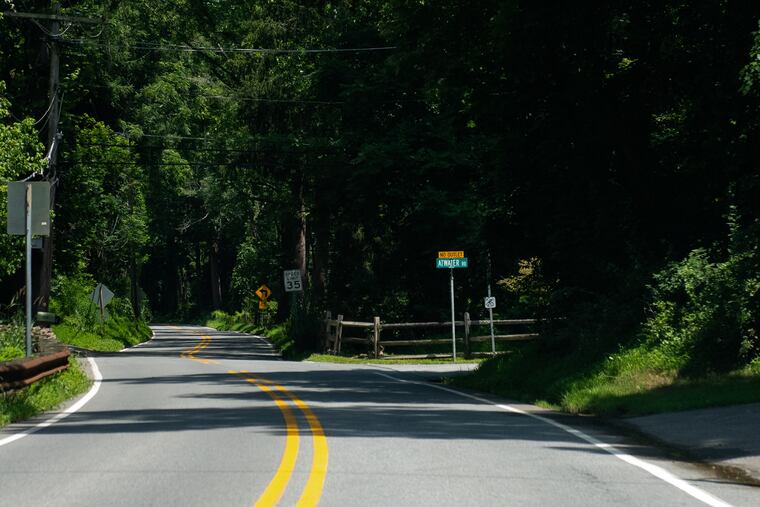Driving while black in Wyeth country | Maria Panaritis
Unless and until State Police persuasively show that corporate executive Rodney Gillespie wasn't targeted for his race, we can conclude only one thing: This is not what “protect and serve” is about. Not in a democracy.

What allegedly happened to Rodney Gillespie at the hands of police in the driveway of his $1.2 million Chadds Ford home is outrageous.
As my colleague Mensah M. Dean reported in a jaw-dropping Inquirer story, Gillespie is a high-ranking executive with the multinational pharmaceutical corporation AstraZeneca who, for apparently doing little more than driving his family home one night, was handcuffed and humiliated last month by a Pennsylvania state trooper.
Gillespie’s big infraction: being a black man while driving south on Baltimore Pike near Brandywine Battlefield, making a right turn onto a two-lane road, and then making another right turn onto the narrow road leading to his development.
Police have been largely mum about the substance of the encounter, given that it is under investigation internally after Gillespie filed a complaint. But on its face, it looks terrible.
Close your eyes, after you read a recap of the Gillespie family’s account below, and imagine one thing: that instead of the driver being a black man behind the wheel of a late-model SUV, it was a white partner at a prominent Center City law firm making his way back home to Radnor.
Gillespie, 52, with his wife of 25 years, Angela, in the passenger seat, and their teenage daughter in the back of the rented Jeep Grand Cherokee Laredo, had only recently returned to the United States from an overseas assignment. They’d moved back into the home they built and lived in back in 2007, on a secluded street with no sidewalks. The house is in wooded Chadds Ford, where the census says only 1.4 percent of the population is black.
Just after midnight July 8, as they returned from a get-together at a relative’s house in New Jersey, a trooper began following Gillespie on Baltimore Pike. The officer did not activate his flashing lights until Gillespie turned onto the street where he lives. Gillespie came to a stop in his own driveway.
The trooper approached with his hand on his gun and began barking.
How old are you? Why did you stop here? Don’t give me that s—! Get out of the car! Why are you driving a rental car? Do you have drugs? Guns? Is that your girlfriend in the car?
If you can imagine — and that’s what we all must do here to feel the empathy needed to demand better — it gets worse.
The trooper — a rookie — pulled Gillespie from the SUV and handcuffed him. He then reached into Gillespie’s pants pocket and removed his wallet. Other troopers showed up. Gillespie’s terrified wife was allowed to pull up a professional bio of her husband on her phone and show it to police. Angela Gillespie cried as she recounted the incident to The Inquirer.
Her husband finally was let out of the handcuffs and given a citation for crossing the double-yellow lines on the street leading to his street — an infraction for which he paid a $142.50 fine but which Gillespie told me he will dispute because it didn’t happen.
Until police persuasively show something other than what Gillespie has recounted of that night, we can conclude only one thing: This is not what “protect and serve” is about. Not in a democracy. Not by a mile.
For all their wanting to stay mum while insiders look into the conduct of one of their own, State Police did muster the creativity to do something else.
They sent a sergeant to the Inquirer newsroom this week with a message: In every case last year in which someone complained about racial profiling, Sgt. William C. Slaton told The Inquirer, State Police were found innocent — and by none other than the people running those investigations from within State Police ranks.
You can see how that may ring hollow here.
Gillespie is a high-level executive for a corporation whose shares are traded on the New York Stock Exchange. He and his family lived in their home without any traffic incidents for about six years, before AstraZeneca transferred him overseas a few years ago to London and then to Johannesburg, where he was the company’s top-ranking official.
Consider this, too: The road with the double-yellow lines where a trooper went out of his way to identify a public health hazard is a portrait of country quiet worthy of a painting by native son Andrew Wyeth.
I drove the fateful route myself a few days ago, rolling down the pike south past the Chadds Ford Tavern, past the post office, a white woman in broad daylight motoring through affluent Chadds Ford in a long-in-the-tooth compact sedan.
Then I made a right onto Webb Road — just the way the trooper did.
It’s a claustrophobic, cozy country road with asphalt. No shoulders — just two narrow lanes and a double-yellow line, cutting through a canopy of trees. According to PennDot, each lane is just 10 feet wide and the road dates to 1942.
Only 1,500 vehicles use it each day.
It’s a tragedy that one of them was driven by a fine citizen who deserved far better in his own backyard.